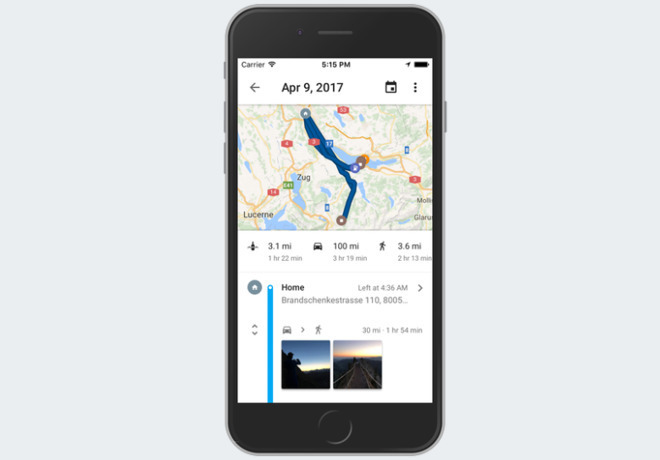Google updated help center documentation Thursday to clarify its location data collection policies, changes made in light of recent revelations that the firm's apps and website continue to harvest user information even when a global "Location History" setting is disabled.
Earlier this week, the Associated Press, with help from Princeton researchers, broke news that Google logs users' location data even when features that are meant to stop the tracking are enabled. Whether on iOS or Android, many Google apps — including Google Maps — store a user's location whenever the app is opened.
In response to the report, Google updated its support documents to better explain the feature, called "Location History," though it continues to collect the data.
Apps like Google Maps require location access in order to provide real-time directions, meaning users must allow iOS to share that data with the app. In an effort to help users who would want to use the app, but don't want their data stored, Google offers a feature called Location History which can pause logging of that data.
Previously, Google's support page said Location History can be turned off by the user at any given time, assumedly preventing visited places from being stored on Google's servers.
"With Location History off, the places you go are no longer stored," the document read. The AP investigation showed this was not the case.
Google's updated language now says, "This setting does not affect other location services on your device," and adds, "Some location data may be saved as part of your activity on other services, like Search and Maps."
"We have been updating the explanatory language about Location History to make it more consistent and clear across our platforms and help centers." Google said in a statement to the AP.
Users who wish to stop tracking altogether must disable "Web and App Activity" in addition to Location History. Leaving Web and App Activity enabled while turning Location History off only prevents additions to the Google Maps timeline, and does not stop data collection.
Google's help center update is not likely to appease users who have scrutinized the search giant and other tech companies for their user privacy policies. The move, however, provides at least some transparency on what data Google is harvesting from its customers.
 Andrew O'Hara
Andrew O'Hara







-m.jpg)






 Christine McKee
Christine McKee
 Malcolm Owen
Malcolm Owen
 Marko Zivkovic
Marko Zivkovic

 Andrew Orr
Andrew Orr

 William Gallagher
William Gallagher





-m.jpg)



40 Comments
50 billion dollar fine.Now
. Why? For human rights violations. Let’s try to catalog the meaningful ones.
The United States.The United Nations. Putting aside how much of an enemy to humanity itself the United Nations is, it does have some interesting documentation. One of these documents recognizes (which generally means fuck all for a government in practice, but hey) the human right to privacy.
The Constitution implicitly grants a right to privacy in the 1st, 3rd, 4th, and 5th amendments. “BUT THAT’S ONLY THE GOVERNMENT!” the leftists will scream. Ah, but which multinational corporation receives FUNDING FROM MULTIPLE GOVERNMENTS AROUND THE WORLD? I wonder…
China.India. The Indian constitution implicitly grants the right to privacy under Article 21, and affirmed in Kharak Singh v. State of U.P.[lxxi]
LOL, just wanted to have a laugh today.
EU. Do you guys even recognize the general right to privacy? I see an act for a “digital right to privacy” including “anonymization on request” (like, the deletion of stuff from a website), but you clearly don’t honor that. Would I have to look at each constituent country’s own laws to see if they include a general right to privacy?
Big surprise.
I hate Google.
Do not worry gatorguy will be here soon to say this was mistake, Google never really did this since there EULA says they do not do these things.
Anyone surprised this was going on.
"The move, however, provides at least some transparency on what data Google is harvesting from its customers." LOL AI you can do better than that as an Apple centric site or perhaps should rename Googleinsider.